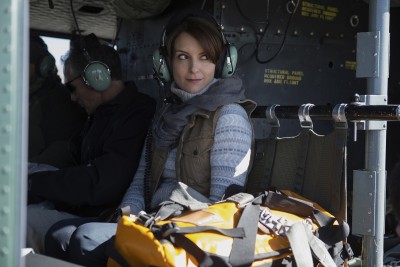
Fourteen years ago, Kim Barker was astonished to find herself thrown into the war-torn countries of Afghanistan and Pakistan as a brand new foreign news correspondent. Now, she expresses her excitement that the story of her journalistic travels has been turned into the major motion picture, “Whiskey Tango Foxtrot,” set for release on Friday.
Barker wrote a memoir, entitled “The Taliban Shuffle: Strange Days in Afghanistan and Pakistan,” that was laced with humor and focused on the relationships she made while overseas as a war reporter in the Middle East in 2011. Michiko Kakutani of The New York Times called it “remarkable” and described Barker as “a sort of Tina Fey character.”
Within weeks, Fey caught wind of the review and successfully pushed for a movie deal.
“To write this book and then have that be the review and have Tina Fey want to [make a movie], it was all very unreal,” Barker said in a recent interview with The Daily Free Press.
Both the book and the film maintain the optimism, humor and bravery that Barker herself exudes. Dressed in a fitted gray turtleneck and black leather skirt with matching boots, Barker’s edgy energy and easy laugh make one immediately realize why The New York Times compared her to Fey.
Although the film only focuses on Barker’s time in Kabul, Afghanistan and depicts her as a television reporter instead of a print journalist, Barker expressed unwavering support for the film and said she was proud of the final result.
“Honestly, it kind of feels like the core of the movie is the same as the core of the book,” Barker said. “They use different things to tell the same story, which is the life we led over there and the idea of being this ‘Kabubble’ and going back and forth from covering really, really horrible things to … this really weird, strange way to live. And I think they captured that really well.”
Barker emphasized that “there’s a lot of humanity in this film” that was truly representative of the personal growth she experienced while overseas. Neither the film nor the book have an explicitly political angle, but rather illustrate the collision of cultures and worldviews that Barker said made her feel “like a fish out of water.”
“We’re human beings and we’re flawed, and I want to be able to show that,” Barker said. “It’s super easy, as a foreign correspondent, to write a book where you look like the smartest person in the room … [but] I didn’t want to do that book. I wanted to show the learning curve that I had, and I wanted to make it funny.”
Barker was especially pleased with the way the film depicts the close relationship she had with her Afghan translator, Farouq, whom she said was an essential piece of her experience in Afghanistan and the formation of the bond she felt with the country and its citizens.
“I wanted to be able to show those really human moments of how we both were kind of jagged at certain points and what it takes to cover this kind of stuff,” Barker said. She said she was glad the film captured how protective Farouq was of her and that one especially emotional scene between the two moved her to tears the first time she saw it.
While the funny moments and touching relationships are central to both the book and the film, Barker also maintains that viewers shouldn’t underestimate the seriousness of the story either.
“This movie has a lot of darkness in it,” Barker said. “And it’s a war, it should have some darkness. The book has darkness.”
Barker expressed her hope that her story will open viewers’ eyes to what life is truly like in the Middle East for journalists and citizens alike.
“I wanted people to learn about Afghanistan and Pakistan,” Barker said. “I wanted people to get a primer on it and also on the work that we do as print journalists.”
Barker emphasized that even though the film’s story changed her occupation, she will always be a print journalist at heart. Overall, her admiration for both the countries she spent so much time covering and the women, whom she called the strongest in the world, comes across with blazing honesty in the story.
“For me, it’s always been about the story,” Barker said. “If I can find a good story and if I can tell that story in a compelling way that makes sense to people back home and makes these folks feel like your neighbors, then I’m at home. I’m at home in that situation.”
























































































































